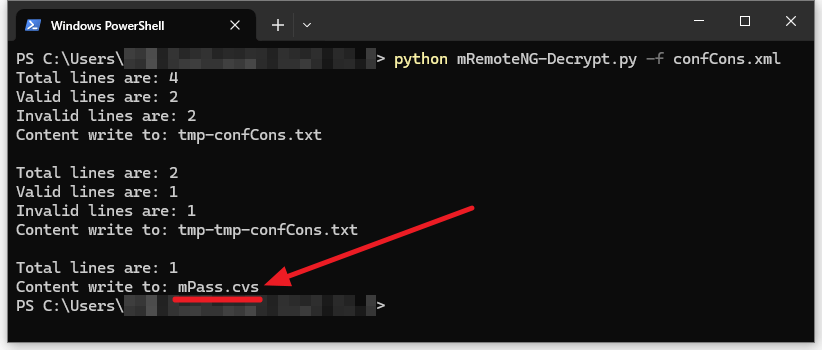前言
话不多说,也是同一款游戏不同的版本,这次附带的 ssh工具是 mRemoteNG.... 也不知道密码是什么 被加密了,经过一搜索 还真搜到了..
经过
解密工具链接
#!/usr/bin/env python3
# 标准库
import hashlib
import base64
import argparse
import sys
# 第三方库
from Cryptodome.Cipher import AES
import pandas as pd
'''
pip3.exe install pycryptodomex
pip3.exe install pandas
'''
def usage():
parser = argparse.ArgumentParser(description="Decrypt mRemoteNG passwords")
group = parser.add_mutually_exclusive_group()# 保证-f和-s只允许有一个
group.add_argument("-f", "--file", help="Name of file which containing mRemoteNG password")
group.add_argument("-s", "--string", help="Base64 string of mRemoteNG password")
parser.add_argument("-p", "--password", help="Custom password", default="mR3m")
# 保证只输入程序名,也会输出帮助信息
if len(sys.argv) < 2:
parser.print_help(sys.stderr)
sys.exit(1)# 0为正常退出,1-127为非正常退出
args = parser.parse_args()
file_name = args.file
string_name = args.string
password = args.password
return file_name, string_name, password
def decrypt(encrypted_data, password):
salt = encrypted_data[:16]
associated_data = encrypted_data[:16]
nonce = encrypted_data[16:32]
ciphertext = encrypted_data[32:-16]
tag = encrypted_data[-16:]
key = hashlib.pbkdf2_hmac("sha1", password.encode(), salt, 1000, dklen=32)
cipher = AES.new(key, AES.MODE_GCM, nonce=nonce)
cipher.update(associated_data)
plaintext = cipher.decrypt_and_verify(ciphertext, tag)
return "{}".format( plaintext.decode("utf-8") )
def handle_1(file_name):
handle_1_name = "tmp-" + file_name.strip(".xml") + ".txt"
with open(file_name, "r", encoding="UTF-8") as fr:
with open(handle_1_name, "w", encoding="UTF-8") as fw:
lines = fr.readlines()
total_count = len(lines)# 统计原文件一共多少行
valid_count = 0
invalid_count = 0
for line in lines:
line = line.strip("\n")
if len( line.split() ) <= 3:
invalid_count += 1
continue
else:
valid_count += 1# 统计每行分割后大于3段的行数
multi_parts = line.split()
i = 0
for j in multi_parts:
if multi_parts[i].startswith("Name"):
element = multi_parts[i]
fw.write(element + " ")
elif multi_parts[i].startswith("Username"):
element = multi_parts[i]
fw.write(element + " ")
elif multi_parts[i].startswith("Password"):
element = multi_parts[i]
fw.write(element + " ")
elif multi_parts[i].startswith("Hostname"):
element = multi_parts[i]
fw.write(element + " ")
i += 1
fw.write("\n")
print( "Total lines are: {}".format(total_count) )
print( "Valid lines are: {}".format(valid_count) )
print( "Invalid lines are: {}".format(invalid_count) )
print("Content write to: {}".format(handle_1_name) )
return handle_1_name
def handle_2(file_name):
handle_2_name = "tmp-" + file_name
with open(file_name, "r", encoding="UTF-8") as fr:
with open(handle_2_name, "w", encoding="UTF-8") as fw:
lines = fr.readlines()
total_lines = len(lines)
valid_lines = 0
invalid_lines = 0
for line in lines:
line = line.strip("\n")
if len( line.split() ) < 4:
invalid_lines += 1
continue
elif line.split()[2].strip("Password=").strip('"') == "":
invalid_lines += 1
continue
else:
valid_lines += 1
#print(line)
fw.write(line + "\n")
print()
print( "Total lines are: {}".format(total_lines) )
print( "Valid lines are: {}".format(valid_lines) )
print( "Invalid lines are: {}".format(invalid_lines) )
print("Content write to: {}\n".format(handle_2_name) )
return handle_2_name
def main():
file_name, string_name, password = usage()
if file_name != None:
handle_1_name = handle_1(file_name)
handle_2_name = handle_2(handle_1_name)
name_field = []
user_field = []
host_field = []
pass_field = []
with open(handle_2_name, "r", encoding="UTF-8") as fr:
lines = fr.readlines()
total_lines = len(lines)
for line in lines:
encrypted_data = line.strip("\n")
tmp_list = encrypted_data.split()
name = tmp_list[0].strip("Name=").strip('"')
user = tmp_list[1].strip("Username=").strip('"')
encrypt_pass = tmp_list[2].strip("Password=").strip('"')
host = tmp_list[3].strip("Hostname=").strip('"')
encrypted_data = encrypt_pass
encrypted_data = base64.b64decode(encrypted_data)
decrypt_pass = decrypt(encrypted_data, password)
#print( "{} {} {} {}".format(name, host, user, decrypt_pass) )
name_field.append(name)
user_field.append(user)
host_field.append(host)
pass_field.append(decrypt_pass)
dataframe = pd.DataFrame( {"Name": name_field, "Hostname": host_field, "Username": user_field, "Password": pass_field} )
dataframe.to_csv("mPass.csv", mode="w", index=False, sep=",")
print( "Total lines are: {}".format(total_lines) )
print("Content write to: mPass.cvs")
elif string_name != None:
encrypted_data = string_name
encrypted_data = base64.b64decode(encrypted_data)
decrypt(encrypted_data, password)
else:
print("Please use either the file (-f, --file) or string (-s, --string) flag")
sys.exit(1)
if __name__ == "__main__":
main()到时候运行时报错 缺什么库就 pip install 安装什么库就行..
配置文件存储位置
如果是正常安装包版本应该是在 C:\Users\username\AppData\Roaming\mRemoteNG\confCons.xml 这个目录
如果是绿色版别人发过来的 那文件夹首页的 confCons.xml 就是
运行结果
把脚本和配置文件防止一个文件夹中直接运行就能看到生成了三个文件
tmp-confCons.txt、tmp-tmp-confCons.txt、mPass.csv
python mRemoteNG-Decrypt.py -f confCons.xml明文密码存储在 mPass.csv中





